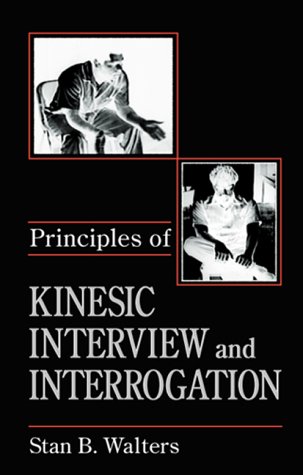Practical Aspects of Criminal and Forensic Investigations
2 total works
Principles of Kinesic Interview and Interrogation, Third Edition
by Stan B. Walters
Published 15 June 2012
The third edition of this perennial bestseller continues to cover the principles of kinesics, including how to determine behavior from speech and body language, and how behavior is often exhibited in written statements. Addressing current issues faced by professional investigative interviewers, this edition adds chapters covering the electronic recording of interviews, tools of influence and compliance, interviewing psychopaths, interviewing children, and false confessions. The author also discusses new techniques based on current research and the increased demands for expert testimony to be scientifically based. This edition also provides new photographs and updates existing ones.
In 1975, research studies performed by the Rand Corporation found that the single most important factor directly affecting the outcome of any investigation is the quality of information obtained from the witness or victim of the event. It follows that proper interviewing and interrogation techniques can significantly affect the success of an investigation. Principles of Kinesic Interview and Interrogation explores the complex challenges of basic and advanced interview and interrogation techniques. It discusses the multi-phase behavioral analysis system of kinesic interviewing, and shows how this system is used to conduct more effective and efficient interpersonal communications. It covers the principles of basic kinesics, including how to determine behavior from speech and body language, and also illustrates how behavior is often exhibited in written statements. In Principles of Kinesic Interview and Interrogation, these behavioral attributes are shown to indicate the "psychological fingerprint" of a particular person, which then can be combined with diagnoses of verbal and non-verbal behavior to develop an interview and interrogation that is specifically profiled for a particular subject.
This book describes in detail the Practical Kinesic Analysis and Interrogation Phases. It shows how, in the Analysis phase, behaviors are observed and decoded to determine the subject's truthful and deceptive behaviors, and oral and/or written statements are taken and assessed. It also explains how, in the subject-specific Interrogation phase, information gained during analysis is most effectively used to obtain truthful statements from the subject.
The art of interview and interrogation is a skill that must be learned, practiced, and honed. With Principles of Kinesic Interview and Interrogation, learning basic and advanced kinesic techniques is made simpler than ever before.
This book describes in detail the Practical Kinesic Analysis and Interrogation Phases. It shows how, in the Analysis phase, behaviors are observed and decoded to determine the subject's truthful and deceptive behaviors, and oral and/or written statements are taken and assessed. It also explains how, in the subject-specific Interrogation phase, information gained during analysis is most effectively used to obtain truthful statements from the subject.
The art of interview and interrogation is a skill that must be learned, practiced, and honed. With Principles of Kinesic Interview and Interrogation, learning basic and advanced kinesic techniques is made simpler than ever before.

